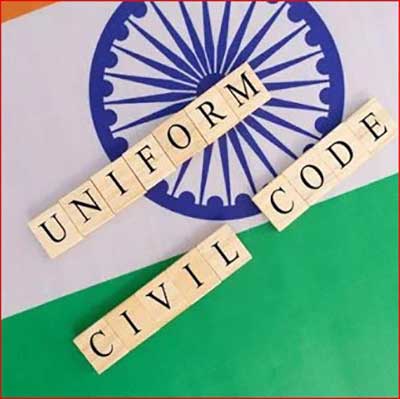Date: 21/01/2023
Relevance: GS-2: Indian Constitution—historical underpinnings, evolution, features, amendments, significant provisions and basic structure.
Key Phrases: Uniform Civil Code (UCC), Religion, Law, Constitution, Personal Laws, Shah Bano Begum Case, Integration, Ideologies, Constituent Assembly, Fundamental Rights, Directive Principle.
Context:
- The recent resurgence of discussions regarding a Uniform Civil Code (UCC) in India has brought to light a number of issues that must be addressed before any final decisions are made.
- The idea of a UCC has been a contentious topic since India's independence, highlighting the intricate and delicate nature of the connection between religion and law in the country.
Key Highlights:
- The Constitution of India under Article 44 provides for directive action as an endeavour of the state to secure a UCC.
- The Supreme Court, while pronouncing its verdict in the Sarla Mudgal case (1995), directed the Union government to reflect upon steps taken by it towards securing a UCC.
- Presently, all communities are governed by their own personal laws on a
range of civil matters.
- Hindus are governed by the Hindu Marriage Act, Hindu Succession Act, Minority and Guardianship Act, and Adoption and Maintenance Act.
- On the other hand, Shariah law governs Muslims and The Christian Marriage Act governs Christians.
- The Special Marriage Act, 1972, can govern all marriages in India regardless of religion.
What Does UCC Envision?
- A UCC envisions an exhaustive and comprehensive statute of personal laws that will govern Indian society uniformly on issues relating to marriage, maintenance, succession, guardianship, adoption and other related matters.
- It would promote joint ownership of benefits by spouses and protect vulnerable sections of society, as envisioned by Ambedkar.
- The Supreme Court, in the Shah Bano Begum case (1985), had observed that a UCC shall help the cause of national integration by removing disparate loyalties to laws which have conflicting ideologies.
- UCC is derived from the very definition of secularism, which in English
refers to the separation of church and state. In the Indian context, this
means separation of religion and state.
- Currently, Goa is the only state in India that has successfully implemented a common code.
Recent Developments:
- The state of Uttarakhand constituted a five-member committee to prepare
a draft proposal in May 2022. More recently, Gujarat followed suit and
announced a UCC panel.
- The Supreme Court has dismissed public-interest litigation challenging the Constitutional validity of UCC panels in these two states.
- In December 2022, the Kerala high court suggested that the Centre must seriously consider framing a uniform marriage code in order to promote common welfare.
- In Parliament, a private member’s bill introduced in the Rajya Sabha
that seeks a UCC proposes the constitution of a national inspection and
investigation committee for its preparation and enforcement.
- However, the choices to be made between legislating common ethics and offering individual religious liberty are fraught with tension.
- The Supreme Court, in the John Vallamattom case (2003), expressed
regret on the lax implementation of a UCC.
- It noted that a common civil code shall aid national integration by removing contradictions based on ideologies and reiterated the need for a UCC in its triple talaq ruling of 2017.
A Peek into the Past:
- The Constituent Assembly was also divided over a UCC.
- Those who believed that the state and religion were of no concern to each other called for the inclusion of a UCC under fundamental rights.
- They argued that different personal laws drawn from religious belief would split the state into watertight compartments and result in multiplicity of laws, with the common national good being trumped by narrower community interests.
- There were also those who strongly argued that the individual right to choice of a personal code should be a fundamental one.
- The fundamental rights sub-committee categorized a UCC as a directive
principle.
- They followed Ambedkar’s equal-respect idea of secularism, granting religious liberty to all communities.
- The expectation was that diverse personal laws would be done away with in due course and a UCC would later be legislated into being with the consent of all stakeholders.
Conclusion:
- The implementation of a UCC in India is a complex task that requires not only the support of the country's political and social elites but also the willingness of the general population to embrace social reform.
- A one-size-fits-all approach, like the one in countries like Italy, the US, and the UK, may not be effective in India, due to the country's diversity in practices.
- The current complex system of civil laws in India often leads to delays and difficulties in the pursuit of justice. A UCC could address the issues arising from the diversity of personal laws by simplifying the legal code and creating a more coherent system.
- The successful enforcement of a UCC at this moment may be less of a challenge than drafting its details. It would be beneficial to approach the issue with a detached perspective and address it in a phased manner, taking into account the cultural and social diversity of the country.
Source: Live Mint
Mains Question:
Q. The implementation of a UCC in India is a complex task that requires not only the support of the country's political and social elites but also the willingness of the general population to embrace social reform. Evaluate (250 words)






















